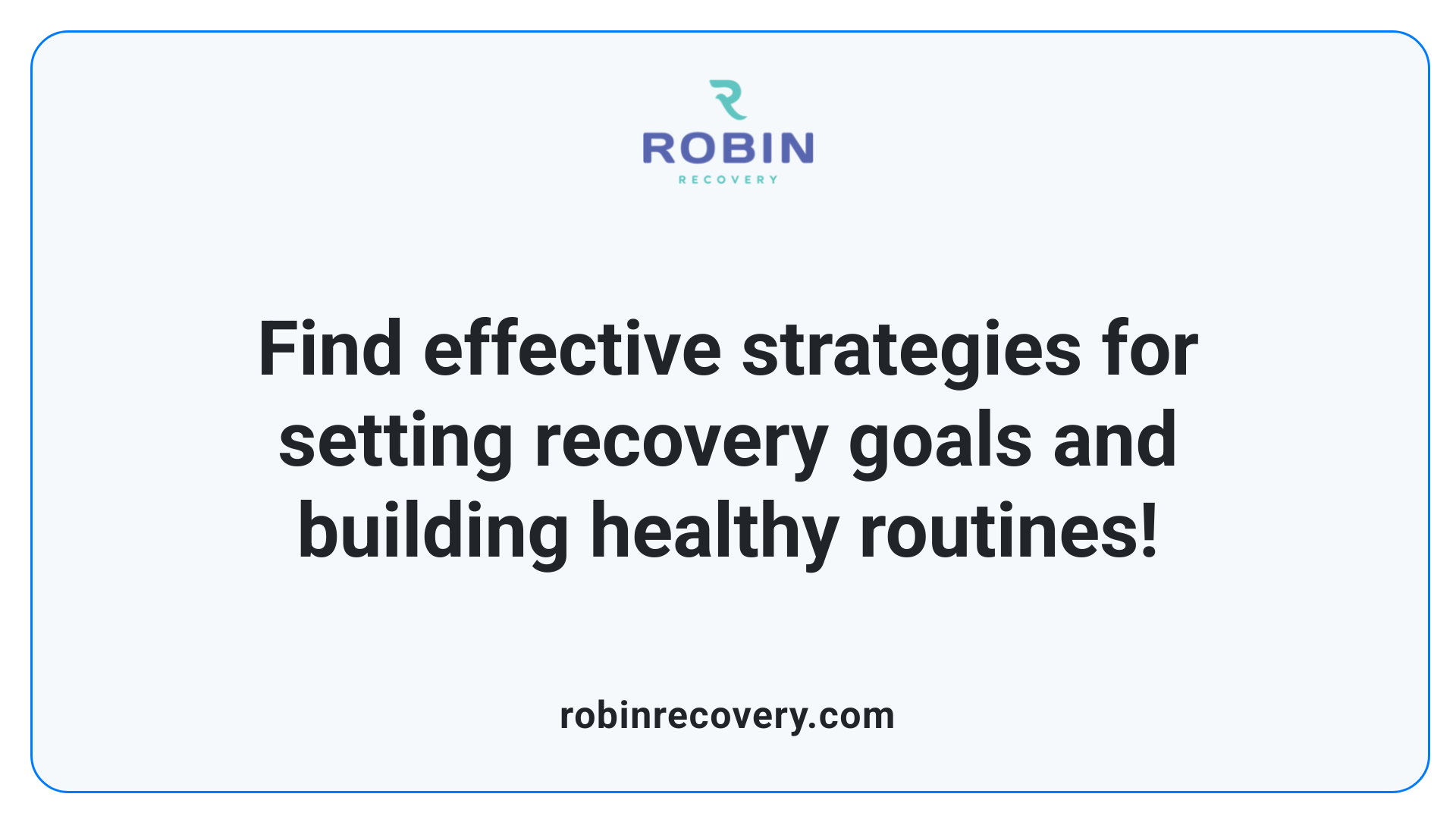How to Maintain Sobriety in a Toxic Environment

Understanding Sobriety in a Toxic Environment
Recovering from addiction is a challenging journey, often made more difficult by the presence of toxic environments and relationships. Whether these are family, friends, coworkers, or social settings, they can pose significant threats to maintaining sobriety. It's crucial to understand how to navigate these challenges and create a supportive atmosphere to aid recovery. This article explores strategies to maintain sobriety in toxic surroundings and emphasizes the importance of supportive networks, healthy routines, and personal growth.
Building Strong Support Networks and Setting Boundaries

Why are supportive networks and healthy boundaries crucial for sobriety?
Supportive networks and healthy boundaries are essential components in the journey toward recovery from addiction. They serve as the backbone for maintaining sobriety and navigating the challenges that arise during this process.
Supportive networks, composed of friends, family, and peers who understand and encourage recovery, provide invaluable emotional support and motivation. They can help individuals feel less isolated and reinforce the idea that boundaries are necessary for maintaining mental and emotional well-being. Social support from such networks not only enhances treatment outcomes but also improves overall quality of life.
Healthy boundaries play a pivotal role in protecting individuals from negative influences and potential relapse triggers. By defining personal limits, individuals can prevent toxic relationships from encroaching on their recovery efforts. Establishing clear boundaries promotes honest communication, fosters trust, and cultivates an environment conducive to personal growth.
In summary, the combination of strong support networks and well-defined boundaries fortifies individuals against the emotional distress and temptations that can accompany recovery, ultimately reinforcing their commitment to a sustainable, drug-free lifestyle.
Identifying and Managing Triggers in Toxic Environments

Recognizing External and Internal Triggers
Understanding triggers is crucial in maintaining sobriety, particularly in toxic environments. External triggers may be related to specific places, situations, or people, such as social gatherings where alcohol is present. Internal triggers encompass emotions, like stress, loneliness, or anger, that can provoke cravings.
To effectively manage potential relapse triggers, individuals should identify their personal warning signs. Common cues include the emotional states of hunger, anger, loneliness, and tiredness (often shortened to HALT). Acknowledging these feelings provides an opportunity for proactive management rather than reactive coping.
Coping Strategies for Managing Triggers
Implementing healthy coping strategies can significantly help in managing triggers. Here are some effective methods:
- Mindfulness practices: Techniques like meditation can assist in grounding emotions and reducing stress.
- Journaling: Keeping a daily log of triggers helps in recognizing patterns and developing specific action plans.
- Setting Boundaries: Clearly communicating personal limits, especially regarding interactions with toxic individuals, reinforces commitment to recovery.
- Therapeutic support: Utilizing resources like SAMHSA’s National Helpline for guidance and tailored support can provide essential tools during difficult moments.
Nurturing a robust support network—whether it’s through friends, family, or recovery groups—further benefits emotional resilience. Recognizing that cravings are temporary and can be managed through healthy choices is vital for sustaining long-term sobriety.
The Role of Personal Growth in Sustaining Sobriety

What role does personal growth play in sustaining sobriety?
Personal growth plays a crucial role in sustaining sobriety by fostering resilience, self-awareness, and emotional regulation, which are essential for navigating the challenges of recovery. Engaging in continuous self-improvement activities, such as setting achievable goals, enhances confidence and provides alternative coping mechanisms to prevent relapse.
Developing emotional intelligence is vital; it allows individuals to recognize their triggers and manage stress effectively without resorting to substances. Being equipped with skills to handle emotions helps mitigate situations that may lead to relapse.
Involvement in community programs like Alcoholics Anonymous strengthens commitment to sobriety through shared experiences and accountability, creating a sense of community that supports recovery.
Ultimately, personal development not only addresses underlying issues related to addiction but also promotes a healthy lifestyle, further solidifying one's path to lasting recovery.
Activities fostering personal growth
Engaging in activities that promote personal growth can notably enhance sobriety. Here are several beneficial practices:
- Setting achievable goals: Focus on small, measurable goals that lead to larger ones, building momentum in recovery.
- Therapy and counseling: Professional guidance helps to navigate emotional challenges and establishes healthier coping mechanisms.
- Physical fitness: Regular exercise improves mental and physical health, combating feelings of stress and anxiety associated with recovery.
- Journaling: Documenting experiences encourages reflection and helps identify patterns that may lead to triggers.
- Mindfulness and meditation: These practices can enhance emotional regulation and reduce stress.
By committing to these personal growth activities, individuals in recovery can create a solid foundation for sustained sobriety.
Effective Goal Setting and Routine Building for Sobriety

What are effective ways to set recovery goals and build healthy routines?
Effective recovery goal setting starts with defining clear objectives by using the SMART criteria:
- Specific: Clearly define what you want to achieve.
- Measurable: Create criteria to track your progress.
- Achievable: Ensure that your goals are realistic given your circumstances.
- Relevant: Goals should support your overall recovery.
- Time-bound: Set deadlines to create a sense of urgency.
Creating a healthy routine is also paramount. Incorporate regular physical activity, balanced meals, and sufficient rest into your daily schedule. This holistic approach promotes better mental and physical health.
Building a support network enhances accountability, whether through group therapy or reconnecting with supportive family members. Surrounding yourself with people who encourage your recovery can be invaluable.
Recognizing and celebrating small victories along the way can fuel motivation. Flexibility in your goals allows for adjustments as you progress. Prioritizing self-determination can help you cultivate personal growth and independence on your recovery journey.
Strategies for Navigating Alcohol-Centric Social Situations
Handling Social Pressures
Navigating social situations where alcohol flows can be challenging for individuals in recovery. Planning ahead is crucial. Here are several strategies to help maintain your commitment to sobriety:
- Set Clear Intentions: Before attending events, remind yourself of your commitment to sobriety.
- Bring a Sober Buddy: Having a supportive friend can make social situations less daunting.
- Identify Triggers: Be aware of your triggers, whether they are emotional states or environmental cues, and prepare strategies to manage them.
- Utilize the H.A.L.T. Rule: Ensure you are not Hungry, Angry, Lonely, or Tired, as these feelings can heighten cravings and temptations.
Avoiding Relapse in Social Settings
To avoid relapse during alcohol-centric gatherings, consider these proactive measures:
- Prepare Responses: Have a prepared line ready to decline alcohol offers politely.
- Attend Sober Activities: Whenever possible, engage in events that do not focus on drinking.
- Engage Your Support Network: Lean on groups like Alcoholics Anonymous for strategies and accountability in tricky situations.
- Create a Relapse Prevention Plan: Anticipate potential pitfalls and develop a plan that includes the steps you will take if faced with temptation.
These strategies can empower you to enjoy social interactions without compromising your sobriety.
The Importance of Professional Recovery Support

When is professional help necessary for maintaining sobriety?
Professional help becomes essential when self-help strategies fall short, especially during emotionally challenging times or when individuals face significant relapse risks. This is where recovery coaching becomes invaluable.
Recovery coaches provide personalized guidance and accountability tailored to individual recovery needs. They assist clients in identifying triggers and devising action plans, fostering healthier life choices. This support is particularly crucial for those who have experienced multiple treatment failures.
Moreover, recovery coaches collaborate with medical and mental health professionals, ensuring therapeutic recommendations are effectively applied. They also help in building a supportive recovery community, a vital component for long-term sobriety and stability.
Benefits of recovery coaching
Recovery coaching offers numerous benefits that can significantly enhance one’s recovery journey. A few key advantages include:
- Personalized Guidance: Tailored strategies designed to meet unique recovery challenges.
- Accountability: Regular check-ins to help individuals stay committed to their sobriety goals.
- Trigger Identification: Helping individuals recognize and navigate potential relapse triggers.
- Community Building: Assisting in forming connections with other recovering individuals, fostering a supportive network.
- Skills Development: Encouraging the development of coping mechanisms and problem-solving techniques.
In summary, professional recovery support, especially through recovery coaching, plays a pivotal role in maintaining sobriety and promoting lasting recovery.
Creating a Safe and Supportive Environment
Tackling the complexities of maintaining sobriety in a toxic environment demands courage, resilience, and strategic planning. By forming supportive relationships, setting clear boundaries, identifying and managing triggers, and embracing personal growth, individuals can fortify their commitment to recovery. Incorporating professional help and consistent goal setting can further bolster one's resolve to lead a sober lifestyle. Ultimately, adapting one’s environment to minimize negative influences while promoting healthy habits offers a transformative path toward lasting recovery. Remember, the journey to sobriety is unique for everyone; the key lies in being proactive, adaptable, and steadfast in one's pursuit of a fulfilling, sober life.
References
- Navigating Toxic Relationships in Addiction Recovery
- How to Stay Sober - Sobriety Strategies - Verywell Mind
- Dealing With Toxic People in Recovery: 7 Survival Tips - Detox
- Eight Tips to Help Support Sobriety at Social Gatherings
- How to Create a Healthy Sober Living Environment - Turnbridge
- The Impact of Environment on Addiction and Recovery
- How to Deal With a Toxic Coworker in Recovery
